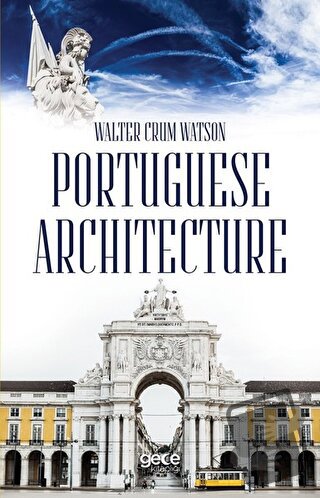
“… Thebuildings of Portugal, with one or two exceptions, cannot be said to excel or even to come up to those of other countries. To a large extent the churches are without the splendid furniture which makes those of Spain the most romantic in the world, nor are they in themselves so large or so beautiful. Some apology, then, may seem wanted for imposing on the public a book whose subject-matter is not of first-class importance.
The present book is the outcome of visits to Portugal in April or May of three successive years; and during these visits the writer became so fond of the country and of its people, so deeply interested in the history of its glorious achievements in the past, and in the buildings which commemorate these great deeds, that it seemed worth while to try and interest others in them. Another reason for writing about Portugal instead of about Spain is that the country is so much smaller that it is no very difficult task to visit every part and see the various buildings with one's own eyes: besides, in no language does there exist any book dealing with the architecture of the country as a whole. There are some interesting monographs in Portuguese about such buildings as the palace at Cintra, or Batalha, while the Renaissance has been fully treated by Albrecht Haupt, but no one deals at all adequately with what came before the time of Dom Manoel…”
| Taksit Sayısı | Taksit tutarı | Genel Toplam |
|---|---|---|
| Tek Çekim | 172,20 | 172,20 |
| 3 | 62,73 | 188,18 |
| 6 | 33,12 | 198,70 |
| 9 | 23,25 | 209,24 |
| 12 | 18,31 | 219,74 |
| Taksit Sayısı | Taksit tutarı | Genel Toplam |
|---|---|---|
| Tek Çekim | 172,20 | 172,20 |
| 3 | 62,73 | 188,18 |
| 6 | 33,12 | 198,70 |
| 9 | 23,25 | 209,24 |
| 12 | 18,31 | 219,74 |
| Taksit Sayısı | Taksit tutarı | Genel Toplam |
|---|---|---|
| Tek Çekim | 172,20 | 172,20 |
| 3 | 62,73 | 188,18 |
| 6 | 33,12 | 198,70 |
| 9 | 23,25 | 209,24 |
| 12 | 18,31 | 219,74 |
| Taksit Sayısı | Taksit tutarı | Genel Toplam |
|---|---|---|
| Tek Çekim | 172,20 | 172,20 |
| 3 | 62,73 | 188,18 |
| 6 | 33,12 | 198,70 |
| 9 | 23,25 | 209,24 |
| 12 | 18,31 | 219,74 |
| Taksit Sayısı | Taksit tutarı | Genel Toplam |
|---|---|---|
| Tek Çekim | 172,20 | 172,20 |
| 3 | 62,73 | 188,18 |
| 6 | 33,12 | 198,70 |
| 9 | 23,25 | 209,24 |
| 12 | 18,31 | 219,74 |
| Taksit Sayısı | Taksit tutarı | Genel Toplam |
|---|---|---|
| Tek Çekim | 172,20 | 172,20 |
| 3 | 62,73 | 188,18 |
| 6 | 33,12 | 198,70 |
| 9 | 23,25 | 209,24 |
| 12 | 18,31 | 219,74 |
| Taksit Sayısı | Taksit tutarı | Genel Toplam |
|---|---|---|
| Tek Çekim | 172,20 | 172,20 |
| 3 | - | - |
| 6 | - | - |
| 9 | - | - |
| 12 | - | - |
“… Thebuildings of Portugal, with one or two exceptions, cannot be said to excel or even to come up to those of other countries. To a large extent the churches are without the splendid furniture which makes those of Spain the most romantic in the world, nor are they in themselves so large or so beautiful. Some apology, then, may seem wanted for imposing on the public a book whose subject-matter is not of first-class importance.
The present book is the outcome of visits to Portugal in April or May of three successive years; and during these visits the writer became so fond of the country and of its people, so deeply interested in the history of its glorious achievements in the past, and in the buildings which commemorate these great deeds, that it seemed worth while to try and interest others in them. Another reason for writing about Portugal instead of about Spain is that the country is so much smaller that it is no very difficult task to visit every part and see the various buildings with one's own eyes: besides, in no language does there exist any book dealing with the architecture of the country as a whole. There are some interesting monographs in Portuguese about such buildings as the palace at Cintra, or Batalha, while the Renaissance has been fully treated by Albrecht Haupt, but no one deals at all adequately with what came before the time of Dom Manoel…”










